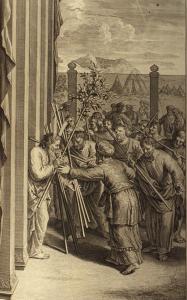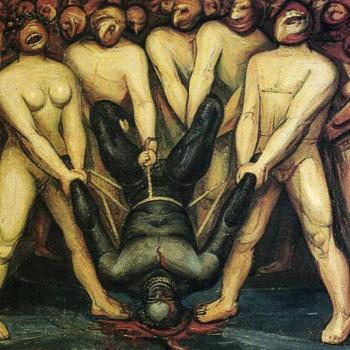
In October 2015, Bloomberg further burnished Robby George’s reputation as the wise man of the Republican Party with an article headlined “Half the Republican Field Seeks Advice From This Princeton Professor.” During the earliest stages of the 2016 presidential campaign, Ted Cruz, Jeb Bush, Ben Carson, Marco Rubio, and Rick Santorum sought Robby George’s advice on how to think about and talk about wedge social issues such as religious liberty, same-sex marriage, and abortion rights (and wrongs), and other “key constitutional values.” Mike Huckabee, who did not meet directly with George, has also said that George is the thinker whose ideas have most influenced him.
At this time, George indicated he would not publicly anoint any of the Republican candidates. In March 2016, however, Ted Cruz announced the endorsement of “Dr. Robert P. George,” his friend, professor, and adviser since his undergraduate days at Princeton, and “an intellectual powerhouse who never cowers to liberal academia.”
It doesn’t really matter whether Robby George dissembled. What we clearly know is that by March 2016 conservative Christians were in a full-out panic about Donald Trump’s Godzilla-like decimation of the rest of the Republican field. Ted Cruz became the candidate around whom they determined to make their last stand. Hence the birth of the “Never Trump” movement.
A “Never Trump” Appeal to Fellow Catholics
In the week prior to Robby George’s Cruz endorsement, The National Review published “An Appeal to Our Fellow Catholics,” a brief but remarkable document, drafted by George and signed by more than 30 conservative Catholic intellectuals, that savaged Donald Trump as a simian – vulgar, retrograde, decivilizing, and “manifestly unfit to be president of the United States.”
There is much we can parse from this compact cri de coeur. Let’s start with the obvious point. No matter how offensive and deranged they might have found Donald Trump to be, these religious conservatives made clear they understood why Americans would prefer Tump to the elitist commissars of the Democratic Party, whose legacy included: “wage stagnation, grossly incompetent governance, profligate government spending, the breakdown of immigration law, inept foreign policy, stifling political correctness – for starters.”
We need to continually bear in mind this caveat to the critique of Trump, because the animus of these Catholic conservatives to the Democratic Party is eternal and absolute and literally knows no bounds, while their opposition to Trump has proven to be entirely contingent, conditional, and transactional. Hence – as we’ve recently seen with Robert George’s hand-in-glove partnership with Mike Pompeo to launch the State’s Department’s new Commission on Unalienable Rights – the oleaginous ease with which most Never Trumpers almost instantaneously fell in line once it was clear any influence in the new administration required kissing The Donald’s ring.
The Wiggle Room
To more clearly assess the wiggle room the Appeal leaves for working with Donald Trump, we also should highlight the fantastic compendium of grievances and goals (sometimes it is difficult to distinguish between them) at the beginning of this document.
In recent decades, the Republican party has been a vehicle — imperfect, like all human institutions, but serviceable — for promoting causes at the center of Catholic social concern in the United States: (1) providing legal protection for unborn children, the physically disabled and cognitively handicapped, the frail elderly, and other victims of what Saint John Paul II branded “the culture of death”; (2) defending religious freedom in the face of unprecedented assaults by officials at every level of government who have made themselves the enemies of conscience; (3) rebuilding our marriage culture, based on a sound understanding of marriage as the conjugal union of husband and wife; and (4) re-establishing constitutional and limited government, according to the core Catholic social-ethical principle of subsidiarity.
This statement elucidates the lineaments of Catholic conservatism. These enumerated values and precepts are the essential program – the irreducible policy output – of Catholic natural law philosophy. What we need to emphasize, then, is that when conservatives (and, in fairness, others who do not think of themselves as conservative), discuss the idea of Western Civilization, what it represents and what is valuable about it, they are largely talking about these values and precepts as the condition for human civilization as we know it – as the basis, in other words, for what makes us fully human, what connects us to God, what separates us from the beasts, and what resolves and restores to harmony the heart arrhythmia of our fall from grace.
We’ll have lots of time to dissect these precepts at the heart of Catholic and conservative social and political philosophy. For now, it is probably sufficient to make just a few points that elide the consequential undertow of this philosophy.
Whose Culture? Whose Death?
First, the list of those subject to the “culture of death” reduces itself to human individuals – the unborn, the disabled and handicapped, and the “frail” elderly – who are physically or cognitively limited, vulnerable, damaged, and marginal. In other words, those among us who require protection are developmentally incomplete, limited, or partial.
I’m sure teleologically (and theologically) there is much one can do with this concept of protection for those humans who are spiritually complete but physically insufficient. But the concept is even more striking for what it categorically leaves out – limitations, disabilities, damage, and marginality that are the result of social, historical, or environmental circumstances – the circumstances and matters that engage us collectively.
This distinction is no accident. Robby George himself will argue, and has argued, that most life outcomes for humans, those conditioned by “mundane” issues such as healthcare, poverty, race or gender, are vagaries, matters perhaps subject to policy debates and political contests where “reasonable and well-informed people of good will” can uncomfortably but with civility disagree. These matters, embedded within history, are not of interest to George because they are not subject to the higher-order, fixed and eternal moral imperatives, associated with natural law moral philosophy, pertaining to “human life” and “human dignity” questions, with non-negotiable answers that are decreed by Israel’s god and enforced by Aaron’s rod.
Primitive Feeling States
Second, the apocalyptic tone of this appeal – with references, flying like flapjacks, to a culture of death, unprecedented assaults, every level of government, and enemies of conscience – is characteristic of the Christian conservative mindset – that almost requires grievance as a goal in itself.
In other words, despite his own alleged commitment to reason as the essence of the imago Dei in humans, in this Appeal to Catholic voters, Robby George deploys language that is so linguistically extreme and emotionally charged and bereft of evidence (because presumably self-evident) that it resembles the communication style on the huskings of Donald Trump himself, whose dark assertions have had nothing to do with logic and persuasion, and everything to do with the activation and confirmation of primitive feeling states. How these primitive feeling states connect to and resemble primitive religious experiences requires further exploration.
Subsidiarity and Integralism
Third, please note the coy reference to “the Catholic social-ethical principle of subsidiarity,” which we learn, almost as an afterthought, is the basis for reestablishing constitutional and limited government in the United States. Some might blanch at this notion of a Catholic-derived constitutional jurisprudence (which escalates the scope of “religious liberty” by several orders of magnitude). However, Robby George’s use of this term merely echoes recent tenets of natural law scholarship from legal conservative stalwarts such as Federalist Society founder, Steven Calabresi, who have deployed some not insubstantial sleight of hand to reimagine the economic concept of subsidiarity in legal and political terms.
Cooptation by Catholic conservatives of the Dorothy Day / Social Justice commitment to subsidiarity is not unrelated to full-throated embrace by many of these same conservatives (in the magazine First Things, and elsewhere) of the far more medieval and sinister concept of integralism, a Catholic revanchism suddenly in fashion that posits a traditionalist, “thick culture” religious extremism that would entirely destroy the “thin” civic space that Robby George reserves for the “less important” policy debates and political contests.
I am thinking here, specifically, of esteemed Harvard Law School professor Adrian Vermuele, who has since his 2016 either/or Catholic conversion moment (hailed by a “Welcome home!”shout-out from “Brother” Robby George) has unhinged himself on behalf of integralism. I am also thinking of another recent convert, Iranian-American journalist and enfant terrible Sohrab Amari, whose scorched-earth auto da fe of fellow Christian conservative David French, enthralled the intellectual architects of our contemporary Counter-Reformation, clearing space for unapologetic embrace of a tear-down-the-house integralism not unlike the permission Donald Trump gave to his base to abandon democracy and embrace autocracy.
The Stage is Set
Contemporary politics endlessly fascinate, and it is deeply tempting to continue to wander into every dark alley that presents itself in our metropolis of fear and loathing. But this series of essays has probably laid sufficient groundwork to allow for the step backwards, across time and space, that allows us to examine directly and remorselessly the Catholic philosophy of natural law that today supports, not merely the politics and jurisprudence of Robby George and other conservatives in the United States, but the very idea of Western Civilization. The defense of this idea – as the highest and most profound expression of a Christian God’s plan for the human species created in his image – buttresses and justifies and provides political cover for nearly every significant moment and movement of European and American history in the past millennium.
Other essays in this series include:
-
The Creation Project: Revealed Religion, Natural Law, Western Civilization, and the Ends of the EarthJuly 10, 2019
-
Culture War Catholicism and American Conservative Politics, July 12, 2019
-
Serving God and Mammon: The Rise and Influence of the Heritage Foundation and the Federalist Society, July 14, 2019
-
Unalienable Rights, Alien Populations and Natural Law: Unspoken Assumptions and Hidden Agendas of Mike Pompeo’s Commission on Unalienable Rights, August 2, 2019
-
God and Religion at Princeton, August 6, 2019
- Robby George’s Primer on Natural Law, August 12, 2019












